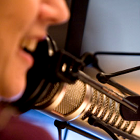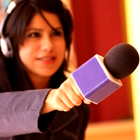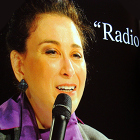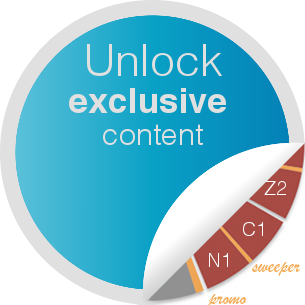Broadcast consultant Valerie Geller lives for inspiring and coaching radio professionals worldwide. “I don’t see radio as radio. I see it as life with a microphone.”
Valerie Geller came to Holland in 2009 for a session about Creating Powerful Radio [book] at the NPOX festival for public broadcasters in the Netherlands. I’ve interviewed her for Broadcast Magazine back then. As we spoke about some timeless radio fundamentals, I’ve rewritten the article into an English version, to share it with you here.
t
Topics
- How to make your radio audience listen to you and care about what you say
- How to make your radio content interesting for both male and female radio audiences
- How to attract listeners by talking about these four specific universal topic categories
- How to create interesting radio content on slow news days when ‘nothing’ happens
- How to create dynamic shows by this magic combination of two radio talent types
Talk with your audience directly
Powerful radio content is often based on good storytelling. Geller repeats her famous one liner: “There are no boring stories, only boring storytellers. If you begin a news story by telling what happened or what is the benefit for listeners, it gets more interesting.” She advises to use radio’s ability to communicate one-on-one. “Instead of: I have 20 tickets to give away, say: You have 20 chances to win a ticket.”
 Care about your radio content
Care about your radio content
In contradiction to classic journalism, Geller argues that radio reporters and presenters should definitely have an opinion about the topic they’ll cover – whether they say it on air or not. “You have to be objective about news, but if you don’t think about your own opinion and why you are doing this, then you basically don’t care. So why should a listener care? You’re then just an actor who reads words from a piece of paper.”
Men and women listen differently
Radio is theatre of the mind, we all know that. Geller adds an interesting insight, based on studies of the human brain. “To absorb information, men need visuals, women need emotion. This is Mars-Venus; the difference between men and women.” Humor works for both, of course. “If you make a listener laugh, you can break all the rules, because you’ve won him or her over.”
 As a broadcast consultant, you visit radio stations all over the world. What are the global trends and how should we anticipate?
As a broadcast consultant, you visit radio stations all over the world. What are the global trends and how should we anticipate?
“The listener’s attention span is shorter and people do more things at the same time, they usually don’t listen for one hundred procent. Therefore we have to say everything short, fast, and to the point. We also really need to explain the listener why this information is relevant. For example, say: if you’re driving a car right now, you need to know that a big accident just happened on this road.”
Give listeners value for time
“Give your audience relevant information that they care about, and use the right storytelling techniques. Years ago it was important to have a [deep, low] voice, now it’s about the content. People will listen to someone with a less perfect voice, if that person has something to say. Apart from that there are 4 topics that people are interested in, no matter where they live.”
Universal radio topics
- well-being (health and safety)
- transformation (improve your life quality)
- emotion (anything that touches the heart)
- power (money and politics)
 What are the major differences between American and European radio?
What are the major differences between American and European radio?
“American radio is all about promoting; the biggest, the greatest. In Europe it’s exactly the opposite. Another major difference is that American listeners and viewers have a shorter attention span. In the US, the average length of a new story is 45 seconds for radio and 1 minute and 30 seconds for television. In Europe it’s 1 minute and 30 seconds for radio, and 2 minutes for TV. But in fact, length doesn’t matter – as long as it’s interesting.”
How can we engage listeners on slow news days?
“Earthquakes, tornados, tsunamis and wars don’t happen every day. News radio is not about big news days – it’s about what you do the rest of the time. You can let your audience meet interesting characters; take you listeners to destinations they can’t visit themselves; teach them new things; let them understand the world and give them topics to talk about. That’s the reason why News-Talk formats are on top in many of the major radio markets in the US and why a station such as BBC Radio 5 live is doing really well in the UK.”
 Does it work in every market? 89.3 Radio West once switched from Full Service AC to News-Talk which had a dramatic impact. They instantly lost a huge amount of listeners and decided to go back to the original format.
Does it work in every market? 89.3 Radio West once switched from Full Service AC to News-Talk which had a dramatic impact. They instantly lost a huge amount of listeners and decided to go back to the original format.
“Any radio station in the world that executes the techniques for effective communication the right way, will be successful, I’m convinced of that. Give creative people a canvas and colors and they might surprise you. I can just teach them how to frame their work, so it will have a stronger impact.”
You can teach people how to communicate more effectively. On the other hand: not everyone is a personality like Howard Stern [book].
“Howard is funny and intelligent and he prepares himself very well. He reads everything, is part of life and uses his life experience as content for his show. I advise radio talent to observe everyday life and use what they see and hear. You also have to know what other people are talking about. Most people outside the US know Howard from Private Parts [movie], and maybe from his autobiography [book] or his TV show. But on the radio he really comes to life.”
 Generator + reactor = powerful radio
Generator + reactor = powerful radio
“An important concept of powerful radio is based on two sorts of people: generators and reactors. A reactor faces a blank page without fear, but needs input from a generator; someone with a million ideas. Two generators together doesn’t work; they’ll fight for the microphone, and two reactors sound boring. The magic formula is generator-reactor. Howard Stern is a brilliant reactor and his sidekick Robin Quivers is a perfect generator.”
We live in a multimedia world where news reporters and content producers have to master several disciplines. We work for different media simultaneously and do more in less time. In your experience, does it affect the quality of the content?
“Internet is radio, television and newspaper in one, interactive medium. A mediaplayer where you can hear audio, watch videos or send text messages to the presenters is one of the developments that make this time exciting. Fantastic, we have three canvasses to paint on! If a radio station hires communicators, these people can also learn the other disciplines. It’s not about the medium, it’s about the message, or content in context – this is what happens, and this is why you need to know about it.”
 How do you see the future of radio?
How do you see the future of radio?
“This actually depends on the future of humanity. But I expect we’ll listen to radio in many new ways, like currently through mobile phones. Even if it comes through the fillings in your teeth, who cares, if the content is interesting? Every day we fight the battle of being a human; we have to get through the day again and again. I don’t see radio as radio – I see it as life with a microphone. I think it will always be here.”
What does radio mean to you personally?
“I always loved radio. From the moment that I knew you can turn it on, and hear people talk and exchange ideas. You can grow up in a certain environment, but if you hear people with different life experiences, it can open up your world. Television is often watched collectively, radio is often listened individually. Radio is the last magic, if you know what it means to someone who is alone or feels alone. You don’t have to be alone, because radio is your friend and companion.”
 About
About
Valerie Geller started her radio career as a journalist, reporter and presenter, and has been developing News-Talk formats for stations in Los Angeles and other markets. After her job as program director of the legendary News-Talk (former Top 40) station WABC New York in 1990, she started to work as a consultant. She worked with stations all over the world, such as public broadcasters BBC (UK), ABC (Australia), and SR (Sweden).





Add Your Comment